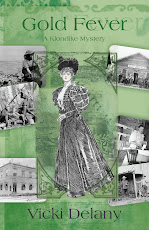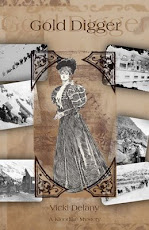

In Gold Mountain, the third in the Klondike Gold Rush Series, due out next April from Dundrun Press, there are some flashbacks to when Fiona and Angus first arrived in Skagway, Alaska in August of 1897. Fiona’s on the run from the law in Toronto. She has no intention of going on the difficult trip to Dawson, and thinks it might be a nice idea to set up a theatre in Skagway, something for the entertainment of all the eager prospectors sure to follow.
Then she has an encounter with the legendary outlaw Randolph Jefferson Smith, and decides it expedient to take her prospects across the border into Canada and then to Dawson City.
Smith (aka Soapy) is a real historical character and I did a fair amount to research into him for his small part in this book. There was pretty much nothing in Skagway before July of 1897, when news of the gold strike hit the cities of the south and tens of thousands of people headed north. Skagway, and nearby Dyea, were the jumping-off points for the interior. Passengers travelled by ship from Seattle, San Francisco, Vancouver or Victoria and disembarked at Skagway or Dyea to head overland into Canada.
The aforementioned Mr. Smith, who got his nickname from a confidence game involving a bar of soap, was one of the first on the scene. Seeing an opportunity, he quickly took over the town, and ruled Skagway for the next year.
What little there was in the way of law and order, looked the other way. (The Marshall was in Smith’s pocket.)
Smith was killed in July of 1898 in a shootout on the Skagway waterfront. His killer died of his own wounds a few days later. The picture of Smith on the horse was taken was he was the Grand Marshall of the July 4th parade, but a few days before his death.

Meanwhile, at the top of the Chilkoot Trail, at the Canadian border, the North-West Mounted Police kept a Maxim Machine Gun with the express purpose of keeping Soapy and his gang out of Canada.
Many an American was not impressed to arrive in Canada and find that there were rules and the law was enforced. For example, the NWMP inspected all boats leaving Lake Bennett for sea-worthiness, and insisted that women and children get out and walk around the rapids. In town they kept an eye on the gambling halls and cribs, enforced Sunday closing, and banned firearms from town and the Creeks.
And created a very Canadian version of the not-so-wild west.

The picture to the right is of Sir Sam Steele, who in typical Canadian fashion, gets far less recognition than he deserves.












No comments:
Post a Comment